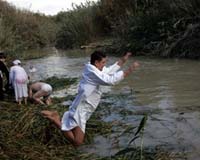 |
Uppsala, Sweden (SPX) Jul 22, 2010 Much organically bound carbon is deposited on inland lake bottoms. A portion remains in the sediment, sometimes for thousands of years, while the rest is largely broken down to carbon dioxide and methane, which are released into the atmosphere. Swedish researchers have shown that carbon retention by sediment is highly temperature-sensitive and that a warmer climate would result in increased carbon dioxide emissions to the atmosphere. The study is published in the current issue of the journal Nature. Particles of different kinds - including microscopic algae, other plankton and humus from surrounding land areas - are continuously deposited on lake bottoms. The breakdown of a portion of this matter by bacteria in the sediment contributes significantly to atmospheric carbon dioxide. Lake sediment nevertheless constitutes an important "carbon sink," serving to store - sometimes for a very long time - a significant portion of the carbon-containing material that does not decompose. To date, it has been unclear to what extent organic, carbon-containing material remains on lake bottoms, as opposed to being broken down. A group of researchers under the leadership of Professor Lars Tranvik at the Department of Limnology at Uppsala University has found a strong connection between the carbon dioxide production of lake sediment and bottom-water temperature. "What we have discovered is that a very similar temperature-dependence relationship holds for a wide range of lake-sediment types," says doctoral student Cristian Gudasz, who was responsible for data collection and evaluation. "Temperature affects carbon-dioxide production in much the same way regardless of a lake's nutrient content and geographic location and the chemical composition of the sediment." The discovery of a broadly robust temperature-dependence relationship set the stage for an investigation of the effect of temperature on lake sediment in the boreal forest zone that runs through Eurasia and North America and contains millions of lakes. The annual rate at which bound carbon is deposited as sediment in the lakes of the boreal zone will fall by 4-27 per cent, depending on which climate forecasts are borne out, over the next hundred years. The production of carbon dioxide by lake sediment will increase correspondingly, resulting in higher levels of emissions to the atmosphere. It is becoming increasingly clear that inland water systems play an important role in the global carbon cycle, in spite of the fact that they only cover 3 percent of the land area of the Earth. The study under consideration demonstrates how the role of inland water systems can be expected to change in response to climate change.
Share This Article With Planet Earth
Related Links Uppsala University Water News - Science, Technology and Politics
 Jordan River too polluted for baptisms: eco group
Jordan River too polluted for baptisms: eco groupJerusalem (AFP) July 21, 2010 An environmental group on Wednesday called for a halt to baptisms in the Jordan River where tradition holds that Jesus was baptised, saying the waters there were dangerously polluted. "Friends of the Earth Middle East call on regional authorities to halt baptism in the lower Jordan River until water quality standards for tourism activities there are met," said a statement from the group. ... read more |
|
| The content herein, unless otherwise known to be public domain, are Copyright 1995-2010 - SpaceDaily. AFP and UPI Wire Stories are copyright Agence France-Presse and United Press International. ESA Portal Reports are copyright European Space Agency. All NASA sourced material is public domain. Additional copyrights may apply in whole or part to other bona fide parties. Advertising does not imply endorsement,agreement or approval of any opinions, statements or information provided by SpaceDaily on any Web page published or hosted by SpaceDaily. Privacy Statement |